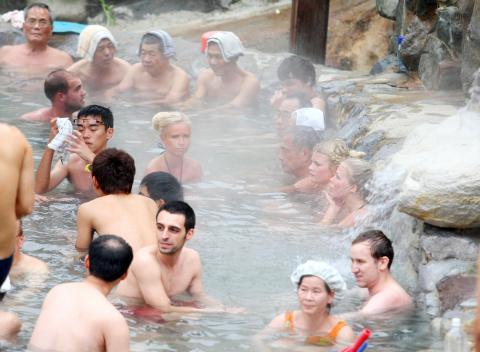Taipei Mayor Hau Lung-bin (郝龍斌) yesterday visited Beitou (北投) Park to promote the district as a popular tourist attraction, soliciting votes for the district in a competition that will select the 10 most popular tourist sites in Taiwan.
Taipei’s Beitou and Xinyi (信義) districts were included with 17 towns selected to enter the competition for the “Top Ten Tourist Towns” campaign, which was launched by the Tourism Bureau as part of its effort to boost tourism in Taiwan.
Beitou, known for its hot springs, with a great number of spa facilities and Japanese-style structures, previously topped the list in the online poll, with more than 70,000 votes.

Photo: CNA
However, about 40,000 votes were ruled invalid by the organizers, who said that they were cast from the same IP addresses.
Hau yesterday said the city government respected the organizers’ online poll mechanism, but denied mobilizing staff to vote for the town in the online poll.
“We expect the organizers to keep a fair and just system when calculating the votes in the poll … Beitou is a popular hot spring destination in northern Taiwan, and we call for more support to get the town into the top ten list,” he said.
Local city councilors, including the Chinese Nationalist Party’s (KMT) Taipei City Councilor Lai Su-ju (賴素如) and Democratic Progressive Party Taipei City Councilor Wu Su-yao (吳思瑤), also visited the district and joined the mayor in extolling the town’s attractions.
Wu accused the Tourism Bureau of failing to present any evidence that proved the city had been cheating in the poll and said Hau should lodge a formal protest against the bureau, adding that it had distorted Taipei’s efforts to support Beitou as a top tourist attraction.
The competition includes an assessment from a panel of judges and a public poll, which account for 80 percent and 20 percent of the final scores, respectively.
Public voting begins today and ends on March 9.
For voting and more information, visit the contest Web site at http://taipeitravel.net.

Alain Robert, known as the "French Spider-Man," praised Alex Honnold as exceptionally well-prepared after the US climber completed a free solo ascent of Taipei 101 yesterday. Robert said Honnold's ascent of the 508m-tall skyscraper in just more than one-and-a-half hours without using safety ropes or equipment was a remarkable achievement. "This is my life," he said in an interview conducted in French, adding that he liked the feeling of being "on the edge of danger." The 63-year-old Frenchman climbed Taipei 101 using ropes in December 2004, taking about four hours to reach the top. On a one-to-10 scale of difficulty, Robert said Taipei 101

Nipah virus infection is to be officially listed as a category 5 notifiable infectious disease in Taiwan in March, while clinical treatment guidelines are being formulated, the Centers for Disease Control (CDC) said yesterday. With Nipah infections being reported in other countries and considering its relatively high fatality rate, the centers on Jan. 16 announced that it would be listed as a notifiable infectious disease to bolster the nation’s systematic early warning system and increase public awareness, the CDC said. Bangladesh reported four fatal cases last year in separate districts, with three linked to raw date palm sap consumption, CDC Epidemic Intelligence

Two Taiwanese prosecutors were questioned by Chinese security personnel at their hotel during a trip to China’s Henan Province this month, the Mainland Affairs Council (MAC) said yesterday. The officers had personal information on the prosecutors, including “when they were assigned to their posts, their work locations and job titles,” MAC Deputy Minister and spokesman Liang Wen-chieh (梁文傑) said. On top of asking about their agencies and positions, the officers also questioned the prosecutors about the Cross-Strait Joint Crime-Fighting and Judicial Mutual Assistance Agreement, a pact that serves as the framework for Taiwan-China cooperation on combating crime and providing judicial assistance, Liang

US climber Alex Honnold left Taiwan this morning a day after completing a free-solo ascent of Taipei 101, a feat that drew cheers from onlookers and gained widespread international attention. Honnold yesterday scaled the 101-story skyscraper without a rope or safety harness. The climb — the highest urban free-solo ascent ever attempted — took just more than 90 minutes and was streamed live on Netflix. It was covered by major international news outlets including CNN, the New York Times, the Guardian and the Wall Street Journal. As Honnold prepared to leave Taiwan today, he attracted a crowd when he and his wife, Sanni,